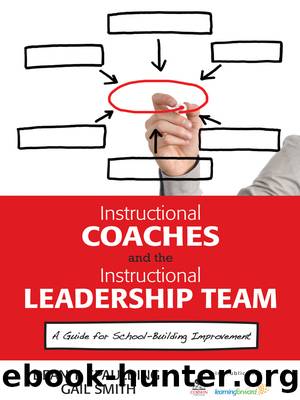Instructional Coaches and the Instructional Leadership Team by Dean T. Spaulding & Gail Smith

Author:Dean T. Spaulding & Gail Smith
Language: eng
Format: epub
ISBN: 9781452284248
Publisher: SAGE Publications
Published: 2012-10-15T00:00:00+00:00
Once the instructional coach (IC) has gotten started, it is important to be responsive to the momentum that one has established by working effectively with the teachers and staff. It is also important to keep coming up with fresh ideas. These ideas not only create interest when working in a building but also provide an opportunity for the IC to build a strong bond between the instructional leadership team (ILT) and school staff. Since the IC might not be able to generate new ideas initially, we thought it would be effective to provide him or her with some ideas that were generated through our work with ICs. We call them âideas of the day.â Use them. Modify them. Add to them, and enjoy.
Idea #1: Designate a place where teachers may leave questions for the IC. As you do your walkthroughs, you might respond right away where appropriate or take the question back to your office for a written response by dayâs end. The sooner questions are asked and answered, the better the level of effective communication in your school. It is also the perfect way to eliminate misinformation and to quell baseless rumors.
Idea #2: If your school doesnât yet have a business partnership, think about the connections you might have via parents, faculty spouses, and so on. Many people and businesses want to help our schools but donât know exactly how they might proceed. Sometimes a simple conversation and a few well-placed suggestions can lead to a great partnership. There is money out there, and if it doesnât go to your students, it will go somewhere else. The same is true for volunteer and community organizations that might just be waiting for an invitation to partner up with your school. As always, you should check with your central office before proceeding into any type of agreement with a business or organization.
Idea #3: Divide your classroom visit notebooks into categories: teaching strategies, curriculum, classroom management, building goals, and so on. Then you can record your thoughts by category for easier reference later on. Note interesting and new data sources you uncover during your visits.
Idea #4: Donât forget that a very important component of successful instructional coaching is the ability to listen reflectively. People want to be heard. When you ask questions, give your full attention to the responses, even if there are distractions competing for your focus. It is also important to listen to what is not said. There is much information in what someone chooses not to say. Donât forget that some teachers, especially our newest ones, often donât ask questions because they are not sure what questions they need answers for. Good listening includes good questioning. Keep asking questions and validate efforts to respond.
Idea #5:Send out a question as part of your weekly faculty e-mail. It should be a question that is easily answered and that relates to the goals you have set as a faculty. Collect the responses for use in the next faculty meeting discussion on the issues at hand.
Download
This site does not store any files on its server. We only index and link to content provided by other sites. Please contact the content providers to delete copyright contents if any and email us, we'll remove relevant links or contents immediately.
Special Education in Contemporary Society: An Introduction to Exceptionality by Richard M. Gargiulo & Emily Bouck(357)
Figuring Out Fluency in Mathematics Teaching and Learning, Grades K-8: Moving Beyond Basic Facts and Memorization by Jennifer M. Bay-Williams & John J. Sangiovanni(297)
Supporting Neurodivergent and Autistic People for Their Transition into Adulthood; Blueprints for Education, Training, and Employment by Danny Combs(253)
Clinical trial strategies for rare neurodevelopmental disorders: challenges and opportunities by unknow(246)
Daily Routines to Jump-Start Math Class, Elementary School by John J. SanGiovanni;(206)
Guiding Children's Learning of Mathematics (11th ed) by Leonard M. Kennedy Steve Tipps(197)
Robust High-Yield Methodologies for 2H and 2H15N13C Labeling of Proteins for Structural Investigations Using Neutron Scattering and NMR by Anthony P. Duff & Karyn L. Wilde & Agata Rekas & Vanessa Lake & Peter J. Holden(190)
Accessing the General Curriculum by Nolet Victor;McLaughlin Margaret J.;(181)
The Lonely Little Cactus; A Story About Friendship, Coping and Belonging by Kelly-Ann Allen & Madeleine Griffith(177)
Feedback in Online Course for Non-Native English-Speaking Students by Larisa Olesova(166)
Begin with the Brain by Kaufeldt Martha M.;(163)
Raising Self-Esteem in Primary Schools : A Whole School Training Programme by Margaret Collins(162)
Reshaping Engineering Education by Fawwaz Habbal & Anette Kolmos & Roger G. Hadgraft & Jette Egelund Holgaard & Kamar Reda(161)
Multimedia in Education and Special Education by Onan Demir; Cari Celik(157)
Bullying Beyond the Schoolyard by Sameer Hinduja & Justin W. Patchin(155)
Conquering Third Grade by Kristy Stark(154)
Negotiating Political Identities by Daniel Faas(146)
Removing College Price Barriers : What Government Has Done and Why It Hasn't Worked by Michael Mumper(146)
Understanding Supervision and the PhD by Moira Peelo(144)
